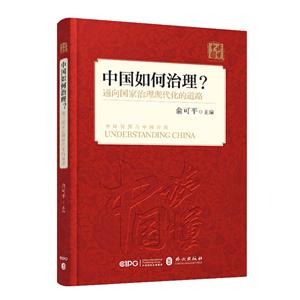
作者:YuKeping[主编]
页数:249页
出版社:外文出版社
出版日期:2018
ISBN:9787119114118
电子书格式:pdf/epub/txt
内容简介
俞可平主编的《中国如何治理:通向国家治理现代化的道路》深入浅出地从制度和程序两个角度论述改革开放后中国通向国家治理现代化的道路,解析“中国发展之谜”,着重回答“中国的改革为什么能够取得成功”“中国是如何进行治理的”“中国治理模式的特征是什么”和“未来中国治理改革的重点是什么”等重大问题。全书共分四个部分,即“引论”“基本制度”“治理方略”和 “结束语”。在“基本制度”部分,概述了国家治理所依托的政党制度、人民代表大会制度、政治协商制度、立法制度等,着重阐明中国治理模式的制度优势和制度特征;“治理方略”部分则详细分析民主选举、依法治国、政治参与、政策制定、政府责任、公共服务、政治透明、权力监督等方面的治理方略。“引论”与“结束语”互相呼应,引论分析了中国治理模式的特点及治理改革战略对中国和平崛起的深远意义,结束语则是简要分析中国在通向国家治理现代化方面所面临的主要挑战,以及未来治理改革的重点。
作者简介
俞可平,著名学者,政治学家,中央编译局原副局长,现任北京大学讲席教授、政府管理学院院长兼北京大学城市治理研究院院长、中国政治学研究中心主任。主要研究领域:政治哲学、中国政治、比较政治、治理与善治、全球化、政府创新。因倡导“治理”“善治”“增量民主”“政府创新”“动态稳定”“协商民主”而广受关注,其《民主是个好东西》一文曾引起极大反响。2008年,被中国改革研究会评选为“改革开放30年30名社会人物”;2011年,被美国《外交事务》杂志评选为“2011年全球百名思想家”;2015年,被《中国新闻周刊》评选为“年度学者”;2016年,成为首位悉尼大学“学者面对面”年度特邀华人政治学家。2017年,《中国社会科学评价》杂志称其为2006~2016年最有影响力的中国政治学者。
本书特色
究竟是什么原因造就了中国的现代化奇迹?换言之,是什么原因使得中国在成功地实现经济现代化转型的同时,还能够保持社会秩序的基本稳定?
俞可平主编的《中国如何治理:通向国家治理现代化的道路》讲述了政治对经济发展的作用尤其重大,没有政治的进步,就不可能有经济的进步。标志改革开放的中共十一届三中全会,本身也是一场政治改革。
哪些是不变的基本制度框架?哪些是变革中的国家治理?弄清楚这两个具体的问题,也就能够大体明白:中国这个世上最大人口规模的国家是如何治理的,从而破解“中国发展之谜”。
目录
Modernizing State Governance
Part I Basic Systems
Chapter I How the CPC Leads
Characteristics of China’s Political Party System
Formation of China’s Political Party System
Functions of the Chinese Political Party System
Future Prospect of Party Politics in China
Chapter 2 How the Organs of State Power Operate
Main Characteristics of the System of People’s Congresses
Historical Evolution of the System of People’s Congresses
Basic Functions of the System of People’s Congresses
Prospects for the Future Development of People’s Congresses
Chapter 3 How Multiparty Consultation Is Conducted
Political Consultation System
Establishment of the CPPCC
Reform and Opening Up, and Political Consultation
Future Reform of the Political Consultation System
Chapter 4 How Laws Are Made
Changes of the Legislative System
Legislative Institutions and Legislative Principles
Legislative Process
Legislative Oversight
Future Reform of the Legislative System
Chapter 5 How the Government Operates
Reform of the Administrative System
Central People’s Government
Local Government
Administrative Procedures 62,
Future Reform of the Administrative System
Chapter 6 How Judicial Coordination Is Carried Out
Evolution of the Judicial System
Trial System
Procuratorial System
Arbitration, Mediation, and Lawyer Systems
Characteristics of China’s Judicial System
Chapter 7 How Society Is Autonomously Governed
Regional Ethnic Autonomy
Self-governance by Rural Residents
Self-governance by Urban Residents
Autonomy of Special Administrative Regions
Characteristics of China’s Autonomy System
Further Improvement of the Autonomy System
Chapter 8 How the Nation Is Defended
National Defense System and Its Changes
Armed Forces
National Defense Mobilization
Characteristics of China’s Defense System
Part II Governance Strategies
Chapter I Election by the People
Development of Election in Exploration
Chinese-style Elections
Major Types of Democratic Elections
Meaning of Electoral Democracy
Future Prospects for Democratic Elections in China
Chapter 2 From Rule of Man to Rule of Law
The Path to the Rule of Law
Major Rule of Law Measures
Achievements and Functions of Rule of Law
Development of Rule of Law and Challenges
Chapter 3 Participate in Political Activities in an Orderly Manner
Significance of Political Participation
Major Methods of Political Participation
Development of Political Participation
Achievements of Political Participation
Characteristics of Political Participation
Chapter 4 Make Decision-making More Rational and
Democratic
Characteristics of China’s Decision-making System
Decision-making in Modern China
Reform of the Decision-making System
Chapter 5 Make the Government More Responsible
Government Responsibilities and Responsible Government
From Strengthening Government Responsibilities to Building a Responsible Government
Building a Responsible Government is Essential
Characteristics and Prospects of Building a Responsible Government
Chapter 6 Make the Government Provide Better Services
From Regulating to Providing Services
Developing Service-oriented Government
Success Stories of Building a Service-oriented Government
Promoting a Service-oriented Government: Difficulties and Prospects
Chapter 7 Make Public Affairs More Transparent
Political Transparency and Democratic Governance
Reform and Opening Up, and Political Transparency
Political Transparency and Political Development
Challenges and Prospects for Political Transparency
Chapter 8 Place Power Under Effective Scrutiny
Significance of Power Supervision
Power Supervision in Modern China
Features of Power Supervision in China
Further Improvement of the Power Supervision System
Conclusion
Journey towards Effective Government and Good Governance
References
Epilogue















